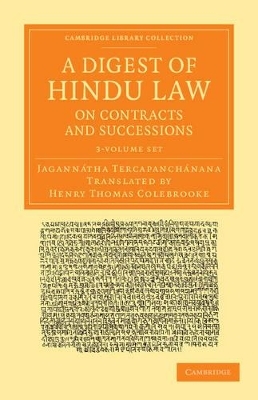
A Digest of Hindu Law, on Contracts and Successions 3 Volume Set
With a Commentary by Jagannátha Tercapanchánana
Seiten
2013
Cambridge University Press
978-1-108-05629-8 (ISBN)
Cambridge University Press
978-1-108-05629-8 (ISBN)
- Keine Verlagsinformationen verfügbar
- Artikel merken
An honorary professor of Sanskrit at Calcutta's Fort William College, Henry Thomas Colebrooke (1765–1837) became Britain's foremost orientalist during the early nineteenth century. Published in 1801, this three-volume compilation and translation of Brahman law was based on the unfinished work of the scholar Sir William Jones (1747–94).
An honorary professor of Sanskrit and Hindu law at Fort William College in Calcutta, and a key figure in the foundation of the Royal Asiatic Society, Henry Thomas Colebrooke (1765–1837) became Britain's foremost orientalist during the early nineteenth century. Taking up the reins of Sanskrit scholarship following the death of Sir William Jones (1746–94), Colebrooke made several substantial contributions to Indic study. Through seminal publications such as a grammar of Sanskrit and an extended article on the Vedas, he provided unprecedented access to one of the world's oldest languages and some of its oldest texts. Published in 1801, this three-volume translation of Brahman law was based on a Sanskrit compilation prepared by a pandit, Jagannatha Tercapanchanana, whose learned commentary is also featured in the work. The volumes cover monetary issues, such as contracts, loans and deposits, and also slavery, marriage and inheritance rights.
An honorary professor of Sanskrit and Hindu law at Fort William College in Calcutta, and a key figure in the foundation of the Royal Asiatic Society, Henry Thomas Colebrooke (1765–1837) became Britain's foremost orientalist during the early nineteenth century. Taking up the reins of Sanskrit scholarship following the death of Sir William Jones (1746–94), Colebrooke made several substantial contributions to Indic study. Through seminal publications such as a grammar of Sanskrit and an extended article on the Vedas, he provided unprecedented access to one of the world's oldest languages and some of its oldest texts. Published in 1801, this three-volume translation of Brahman law was based on a Sanskrit compilation prepared by a pandit, Jagannatha Tercapanchanana, whose learned commentary is also featured in the work. The volumes cover monetary issues, such as contracts, loans and deposits, and also slavery, marriage and inheritance rights.
Volume 1: Preface; Note on the orthography of Sanscrit words; Part I. Contracts: 1. On loans and payment; 2. On deposits, sale without ownership, concerns among partners, and subtraction of what has been given. Volume 2: 2. On deposits, sale without ownership, concerns among partners, and subtraction of what has been given (cont.); 3. On the non-performance of agreements, etc.; 4. On the duties of man and wife; Part II. Successions: 5. On inheritance. Volume 3: 5. On inheritance (cont.); Index.
| Erscheint lt. Verlag | 28.2.2013 |
|---|---|
| Reihe/Serie | Cambridge Library Collection - Perspectives from the Royal Asiatic Society |
| Übersetzer | Henry Thomas Colebrooke |
| Verlagsort | Cambridge |
| Sprache | englisch |
| Gewicht | 2273 g |
| Themenwelt | Geisteswissenschaften ► Geschichte ► Regional- / Ländergeschichte |
| Geschichte ► Teilgebiete der Geschichte ► Militärgeschichte | |
| Recht / Steuern ► EU / Internationales Recht | |
| Recht / Steuern ► Privatrecht / Bürgerliches Recht ► Besonderes Schuldrecht | |
| Recht / Steuern ► Rechtsgeschichte | |
| ISBN-10 | 1-108-05629-6 / 1108056296 |
| ISBN-13 | 978-1-108-05629-8 / 9781108056298 |
| Zustand | Neuware |
| Haben Sie eine Frage zum Produkt? |